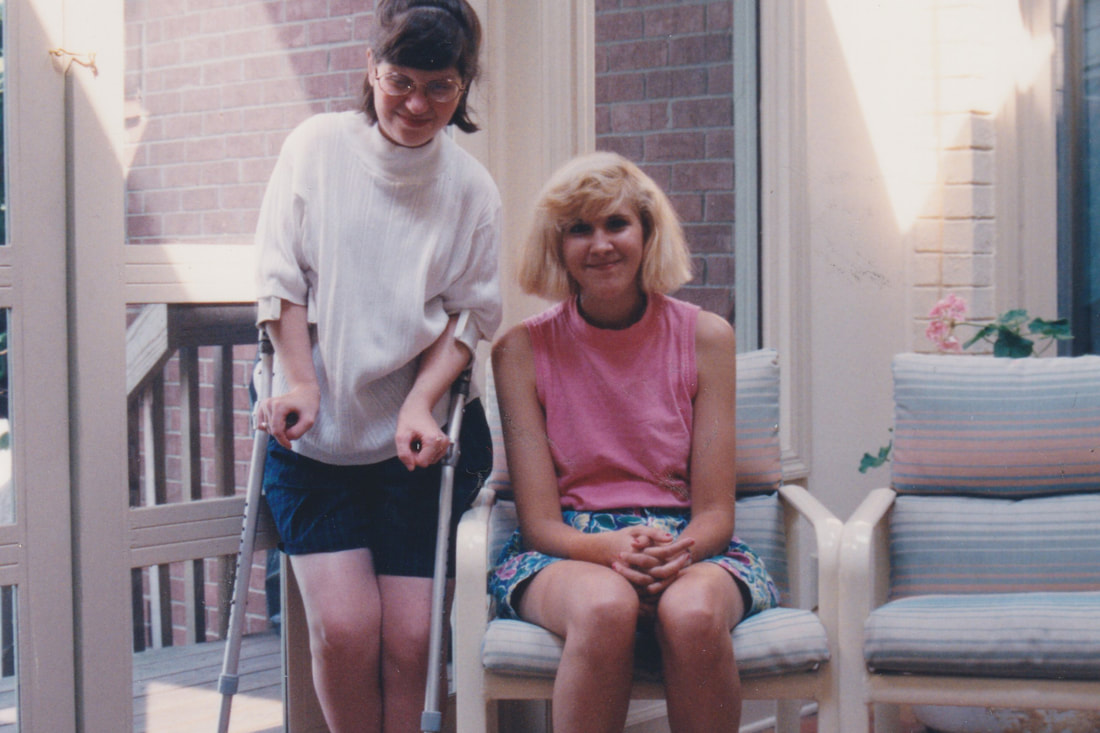|
Most people would have a hard time imagining life with fibrodysplasia ossificans progressiva (FOP), an extremely rare genetic disease in which bone grows in muscles and connective tissue, leaving joints of the body frozen in position. In a sense, the body is forming an extra skeleton. Having lived with FOP for most of my 51 years, I would have a hard time envisioning life without it. FOP has brought great pain, many tears, and sometimes alienation from a world that seeks perfection in life. FOP has also taught me some important lessons about myself and the world in which I live. I readily admit that my feelings about FOP depend a great deal on how closely I feel its presence as a silent enemy within my own body. Yet at all times I cannot help but think that the worst parts of my life are intricately tied to the best parts of my life—that my struggles have made the good things in my life count for more.
FOP can strike as a result of trauma—bumps, falls, injections, and surgeries can lead to an FOP flare-up. FOP also strikes spontaneously. There are also times when, despite obvious trauma, FOP does not appear. In other words, I never know when or where FOP will show up. Was it something I did, and something I could have prevented? My parents likely worry about such matters to protect the child they created, and I can understand that. I think about that sometimes too. But if given a chance to lead my life over again, I think I would still make the same choices, even the choices that hurt me in some way. I don't want to be so afraid of getting hurt that I forget to enjoy life. Though it might sound strange, as a child I never thought of myself as different, even though there were certain physical things that I knew I was unable to do because I could not raise my arms. One particular incident stands out in my mind because it changed all of that. One day, when I was 10 years old, my teacher saw me sitting on the sidewalk during recess while the other kids played a game called two-square. To play this game, two children bounced a ball back and forth in a grid until one failed to hit the ball. The teacher convinced me to try it and told the other students to "go easy" on me. This special instruction soon proved to be unwarranted, as I quickly turned into a very capable player and even moved to a four-player version of the game for a bigger challenge. It was the first time I had done anything physically challenging in my life, and it felt good. My parents encouraged me and painted a court in the garage where children from the neighborhood would come over to play after school. Then, on the last day of school, I fell, injuring my knee. I did not give the incident much thought, for at that time I felt that it would take a much more traumatic event to bring on an FOP flare-up. I soon learned how wrong I was. That incident possibly started a painful four-year cycle in which I lost the motion in my left hip and knee (I say possibly because the initial injury seemed to resolve after a summer). By age 12, however, I had to rely on crutches to walk. I also lost the sense of innocence. The childhood feeling of invincibility that many children seem to hold onto until adulthood was gone. I learned just how simply and quickly things could change. But even if I could turn back time, I would still choose to have the experience—despite the pain—both physical and emotional. My memories of playing four-square mean more because of what I have gone through since then. And, amid the pain and tears, I was introduced to the person who remains my friend an amazing 40 years later. Our friendship is one of the few relationships in my life where I have never felt guilty about being needy, dependent, and demanding (of attention and time) because she chose to be my friend both because of and despite my disability. And I did not need her so much as we needed each other. We recognized a loneliness in each other that can be common at that awkward age. She enjoyed helping me, whether it was carrying my books or making me laugh during a flare-up cycle. I never felt that she was doing these things because she felt sorry for me. Because of those things, I was able to open to friendship and being there for her as well. Coming up: Part 2
1 Comment
Terrie Wurzbacher
4/25/2021 05:16:07 am
Sharon - thanks so much for letting us peek in the window of your life a little. This helps me understand the course of your life just a tiny bit but it’s such an important part of life - we deal with people with “dis-abilities” (which you have turned into an ability) every single day (many of which are invisible and nearly all are misunderstood). You are helping us see the other sode better and I am so appreciative of that. You are amazing. Terrie
Reply
Leave a Reply. |
About meHello. My name is Sharon Kantanie. I'm 54 years old. I have an extremely rare disease called fibrodysplasia ossificans progressiva. I believe in courage, kindness, and other things. Welcome to my little home on the world wide web where I hope to share information on the Kindness Matters Challenge, my life, and the things that matter most to me. Archives
September 2023
Categories |

 RSS Feed
RSS Feed